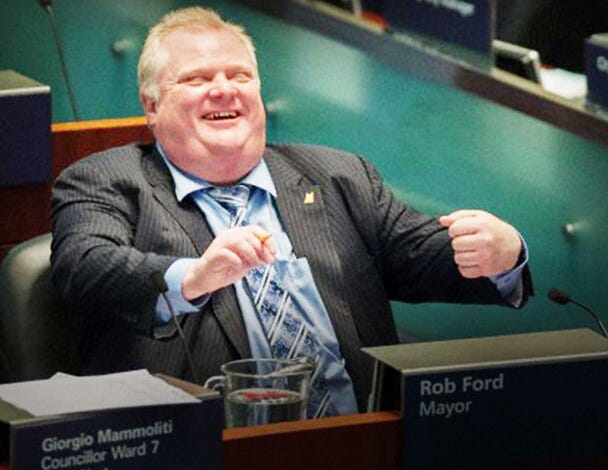Rob Ford proof stronger mayor powers will work
Councils currently have all the power and mayors have little or none. That’s a problem.

Toronto City Councillor Josh Matlow invoked the spectre of Rob Ford to support his argument against giving the city’s mayor stronger powers. Matlow called in to John Moore’s morning radio show on CFRB NEWSTALK1010 Wednesday to decry provincial plans, reported exclusively by the Toronto Star, to give “strong mayor” powers to the mayors of Ottawa and Toronto.
I wrote at length about this yesterday, outlining why stronger mayor powers are needed and how I would go about implementing them. You can read that post here.
But, I think it’s useful to address the “But – Rob Ford!” argument against stronger mayor powers in Toronto.
Matlow’s argument, in short, is this: If former mayor Rob Ford had “strong mayor powers” city council could not have held him in check and the city would have been ruined.
This simply isn’t true.
The Rob Ford example
Rob Ford was elected mayor of Toronto on October 25, 2010 with 383,501 votes drawn from every neighbourhood and city council ward in the city. He was sworn in as mayor on December 1, 2010. Almost immediately, the council was divided into factions with Ford able to lead the majority of councillors through his early agenda of campaign promises. You can read all about the Rob Ford campaign and mayoralty in my book Uncontrollable: Mayor Rob Ford – How I tried to help the world’s most notorious mayor.
Sometime in the early months of 2012, Ford succumbed to his demons and fell into substance addiction. His behaviour became increasingly unreliable and erratic. In 2013, the website Gawker.com published uncorroborated reports that one of their editors had been shown a video of Ford smoking crack cocaine. The Toronto Star quickly published its own story, saying two of its reporters had also seen the video.
Council was, rightly, outraged and called on Ford to resign. He did not. So, Council moved to reduce his powers. Some Toronto mayoral powers are granted by provincial legislation in the City of Toronto Act – outside the purview of city council. The province declined to change its law. Other mayoral powers are granted by Council by-laws which council, naturally, can rewrite. So, it did.
Rob Ford was stripped of most of his council-funded staff and most of his budget. His council-granted powers, and most of his staff, were transferred to the Deputy Mayor (whom Ford had appointed) who ran a parallel administration for the balance of Ford’s term.
Was Rob Ford actually leading the city into disrepair? I don’t think so. But, Council did. They had the power, back then, to clip Ford’s wings. Would they still have the power to do so in the event of a future mayor, with stronger powers, who also ran amok?
What if it happened again under a “stronger mayor” system?
Far from being proof a stronger mayor system would be a disaster, the Rob Ford example provides evidence it’s necessary.
In 2013, Toronto City Council was able to take actions to minimize the mayor’s meagre powers by stripping him of resources and amending the procedures bylaw that allowed him to set some council priorities. In part, that’s because council has all the power and the mayor has little or none. That’s the problem.
Councillors, none of whom are elected with a city-wide mandate, currently have the power to hobble the mayor, who is elected with a mandate to govern the entire city and make changes promised to voters. Council has all the power. The mayor has little or none. Good governance happens in balance. Toronto has poor governance.
The mayor of Toronto needs stronger powers to balance the power sharing between council and the mayor. Not, so the mayor can rule by fiat.
But even council doesn’t have the greatest power in Toronto. “Council is supreme” is a trite phrase thrown about to mollify city councillors who often don’t even recognize they are not pulling the strings. The real power lies with the unelected, unaccountable city staff led unilaterally by the City Manager. A bureaucrat most citizens and voters have never even heard of.
The mayor needs to be CEO of the corporation of the City of Toronto in fact, not just in name. The City Manager and city staff need to report to the mayor. That would return the balance of power to elected officials.
The changes I outlined in my post yesterday would accomplish all of this.
My changes would leave council the power to collectively bridle the mayor – overturning any proposals she/he makes by voting together to overrule them. That’s a proper check and balance.
But, they would allow the mayor to make proposals consistent with his/her electoral mandate without having to buy votes from a coterie of councillors who want to trade their votes on major city-wide issues in exchange for favours that benefit themselves.
My recommendation on restructuring the Executive Committee and directly electing four regional Deputy Mayors would also improve democracy over all at City Hall.
All depends on details that don’t exist yet
We do not yet know what powers the province is thinking about granting the mayors of Toronto and Ottawa. Until we do, we certainly can’t say this is the “end of democracy” in Ontario’s biggest cities.
City councillors are upset because any change to stronger mayors means councillors will lose the disproportionate power they currently enjoy individually and collectively. Councillors routinely use this power imbalance to improve their personal political fortunes at the expense of the better interests of citizens who voted for a mayor to get things done.
Are you OK with stronger powers for big city mayors?



